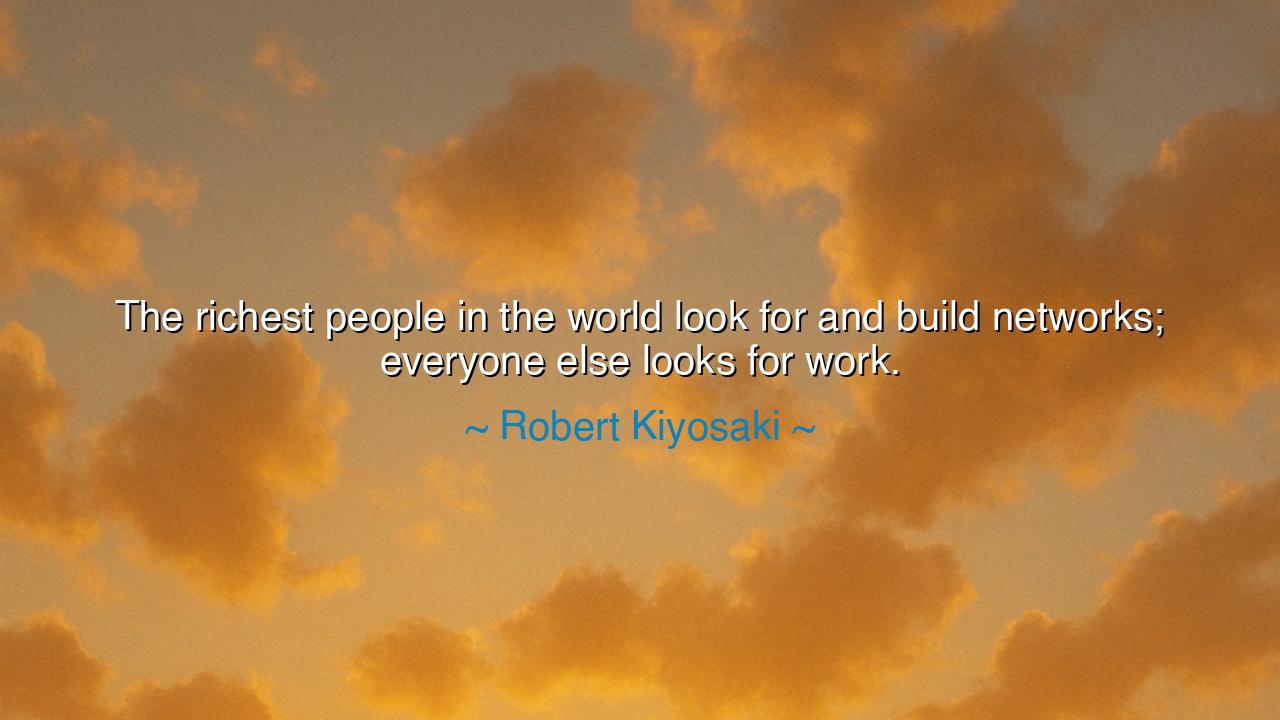
The richest people in the world look for and build networks;
The richest people in the world look for and build networks; everyone else looks for work.






The words of Robert Kiyosaki, “The richest people in the world look for and build networks; everyone else looks for work,” unveil the hidden pattern of wealth and power. He teaches that prosperity does not flow solely from labor, but from the weaving of bonds between people — bonds of trust, exchange, and opportunity. Where the many toil with their hands for daily bread, the few who build networks shape the fields in which bread is grown.
The richest people understand that no one rises alone. They extend their reach through alliances, partnerships, and shared visions, creating webs of connection that yield resources beyond the grasp of the solitary worker. These networks are like roots beneath the earth: unseen, yet drawing strength and sustenance from every direction, feeding the tree of fortune above.
By contrast, those who seek only work bind themselves to a single stream, trading hours for wages, but never learning to shape the rivers from which wealth flows. Labor is noble, yet without vision, it becomes a cage. Kiyosaki’s words remind us that while work sustains, it is the building of networks that multiplies and endures.
Thus, his teaching to future generations is clear: do not scorn work, but look beyond it. Cultivate relationships, nurture alliances, and weave the fabric of connection. For the strength of a single man may fade, but the strength of a network endures, lifting those bound together by its threads. Let it be remembered — fortune belongs not only to the industrious, but to the wise who join hands with others.






HTTruc Huynh Thanh
I find Robert Kiyosaki’s quote thought-provoking. He suggests that wealth is built on networks, not just hard work. But I wonder—how do we differentiate between productive networking and just accumulating connections for the sake of it? Are we truly building meaningful relationships, or are we just trying to collect people to advance our own interests? How do we ensure that networking doesn’t just become another form of transactional interaction?
QNQuynhh Nhuu
Robert Kiyosaki’s perspective on the difference between building networks and looking for work is eye-opening. It seems like the richest people understand the importance of connections, but is this a mindset that can be developed, or is it something that’s easier to do when you already have a certain level of privilege? How do we shift the mindset of those who are struggling to get by, so they can see the value in networking?
NQng quyen
This quote from Kiyosaki makes me wonder—how much is success tied to relationships rather than just finding a job? It seems like networking is essential, but what about people who don’t have access to such networks? Can we really expect everyone to build their own networks, or is there an underlying system that gives some individuals an easier path to creating those connections? How do we level the playing field?
TPThinh Phuoc
Kiyosaki’s statement about networking and looking for work makes me reflect on how much success depends on relationships versus pure skill or hard work. While networking seems to be the key for the wealthiest, does this mean that others are at a disadvantage? Can we create opportunities for ourselves through networks even if we’re not born into wealth, or is this mostly a privilege for those already in a position of power?
KNNguyen Thi Kim Ngoc
Robert Kiyosaki’s quote highlights an interesting distinction between the wealthiest people and the general population. It’s true that networking and building relationships can unlock opportunities, but how do we, as individuals, build those networks if we don’t have the same resources or access? How much of wealth creation really comes down to luck, privilege, or being in the right place at the right time? Can everyone truly build a network like the rich?